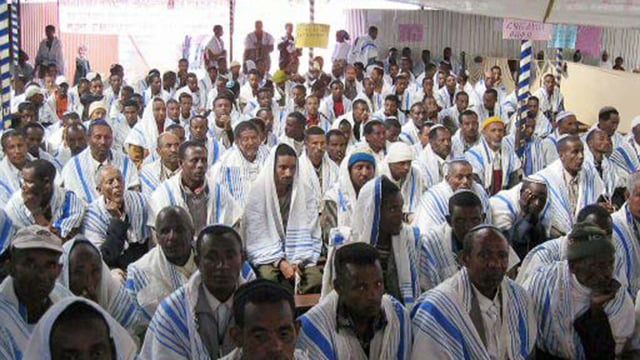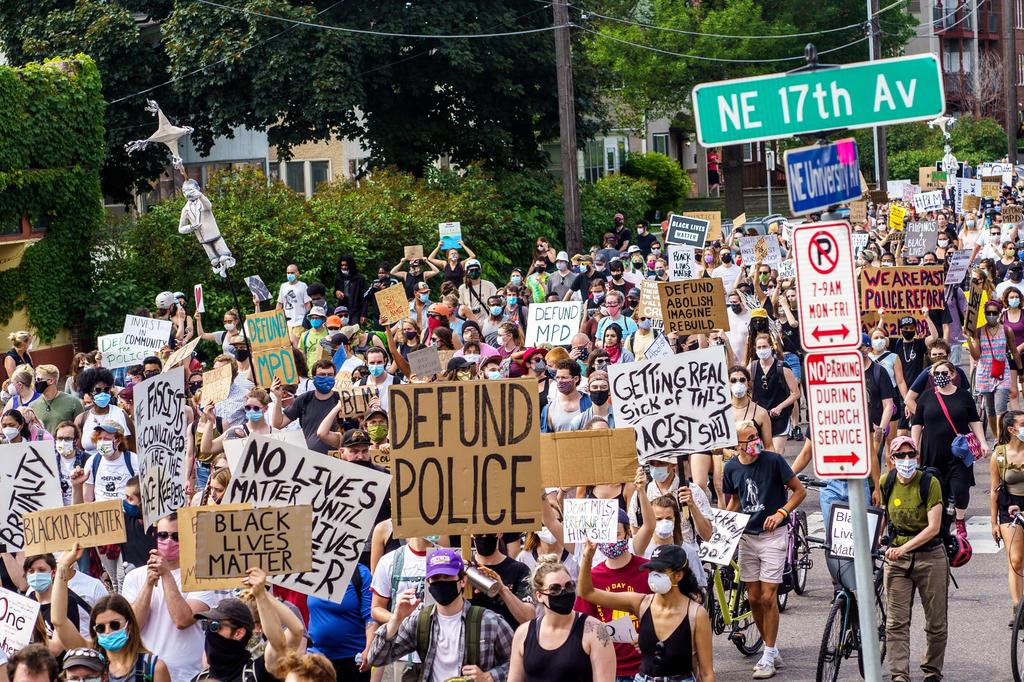Getting your Trinity Audio player ready...
My young son Niv is a sweet and innocent 10-year-old, with dark colored skin.
His parents – my husband and I – were born in Ethiopia. We immigrated to Israel together with the rest of the community, chasing the longtime communal dream to reach Jerusalem.
But this “Jerusalem,” in which the community built its life has many faces – some of which belong to the “ideal heavenly Jerusalem,” but many of which belong to the less-ideal state of “Jerusalem’s reality on Earth.”
Today I am exceedingly fearful as my young and sweet son is growing up and becoming a dark-skinned teenager in a society that loathes black, in a society whose police officers will view him as an “immediate suspect.”
In several years from now, he – just like any other teenager his age – will start going out on his own during the day and at night, walking around the streets of the city, in shopping malls, to and from school.
I am filled with dread as horrific scenarios run through my mind, unfortunately, these are not images of my imagination. These scenarios take place in reality, in the everyday lives of Ethiopian Israeli teenagers and young adults.
The “white” street results in degrading situations and profusely racist expressions towards young Ethiopian Israelis.
7 View gallery
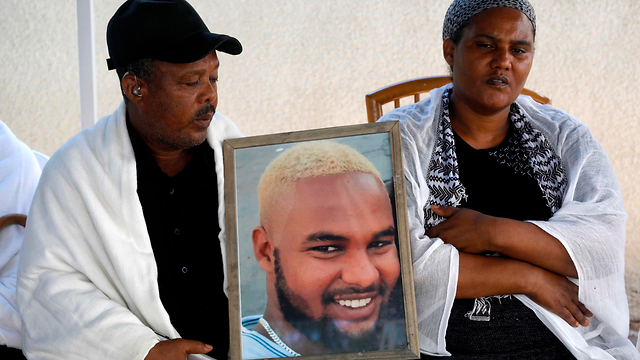

The parents of Solomon Teka display his photo as they sit in mourning for their son, July 2019
(Photo: AFP)
Worst of all, an encounter with police officers on the streets may involve much more than “just” a humiliating incident. It may put a young Ethiopian Israeli in real danger, even life-threatening. Just like what happened to 18-year-old Solomon Teka one year ago today, when he was shot dead by a police officer.
The story of Teka’s life and death fully demonstrates the terror I feel as a mother of a black son growing up in a society in which many of its sectors and groups are racist.
Yes, even in the land our parents and grandparents yearned to reach, my son’s black skin may endanger him. Similar to the dangers faced by black-skinned young adults in Minneapolis, Cleveland, Missouri or New York.
A person’s black skin endangers him!
There was a reason that the awful death of Solomon Teka led thousands of Ethiopian Israelis to protest throughout Israel.
7 View gallery
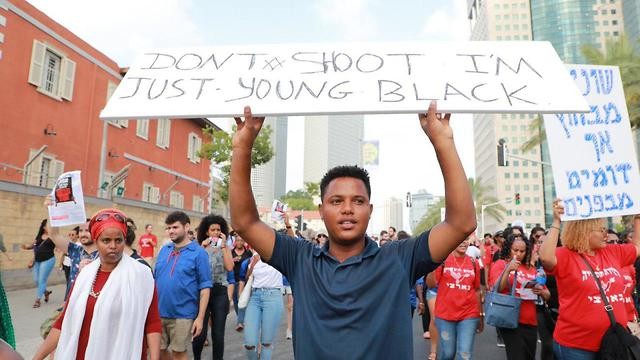

Protesters march against racial inequality in Tel Aviv following the death of Solomon Teka
(Photo: Dana Kopel)
The spontaneous protests quickly became a surge of anger. The streets in Israel’s main cities flooded with young Ethiopian Israelis filled with passion and intense emotion – the result of ongoing frustration over the course of many years of abusive and violent encounters between young Ethiopian Israelis and police officers.
The small Ethiopian community (consisting of only 1.6% of Israel’s population) suffers from this phenomenon that is well-known in urban America – the “visible minority.”
A black person is distinctive and conspicuous and when this conspicuousness is mixed with stigmas about dark-colored skin and various prejudices, it isn’t surprising that we often encounter exclusion, discrimination, and suspicion. All of these translate to barriers – in the job market, in employment advancement, in schools, and in the streets.
And when our visual distinction meshes with police activity that is based on profiling, we all immediately become suspects – especially our young boys and men.
The street, the local park, the street bench – these are the main areas where young people from the Ethiopian community meet (as do other young Israelis), but their conspicuousness resulting from their skin color makes them immediate victims of over policing.
The average police officer immediately suspects them. He patronizes them, authoritatively demands answers to questions that were unnecessary in the first place. And when an event becomes tense and even violent, a gun is often pulled out and the police are much quicker to pull the trigger when facing a young black person.
7 View gallery
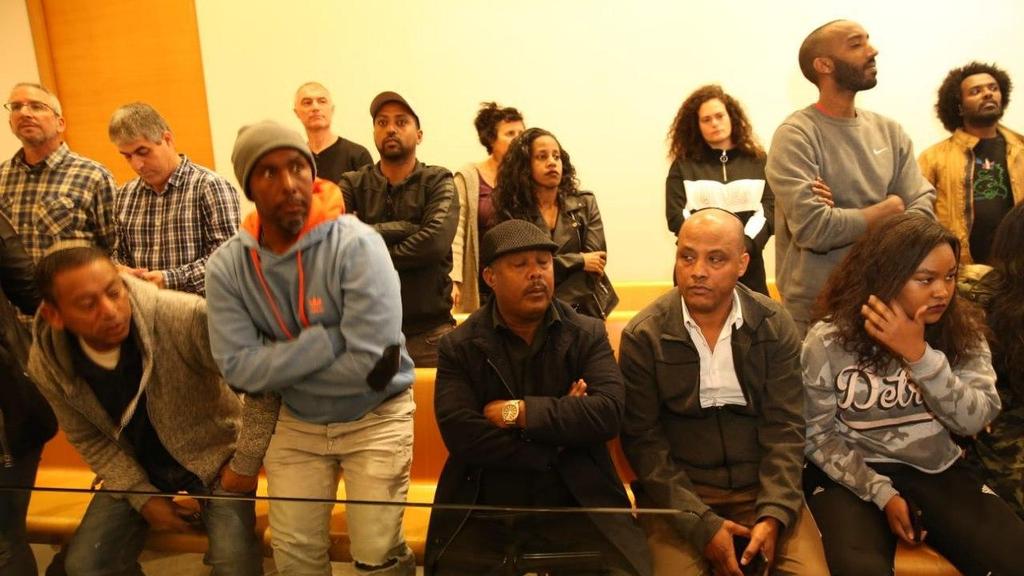

Solomon Teka's family attend the Haifa trial of the cop who shot and killed the teen last year
(Photo: Elad Gershoren)
Since 1997, 11 Ethiopian Israeli boys and young men were killed by police officers. And young Ethiopian Israelis are faced with over-policing, criminal labeling resulting from stringent profiling and general violence on a regular basis, which can only be explained by pure racism.
The result: the number of indictments of Ethiopian Israelis is double their percentage within the general population; the number of legal cases opened among Ethiopian Israeli minors is over 3.5 times their percentage among Israeli minors in the general population; the number of indictments against Ethiopian minors is four times their percentage in the general population; and the percentage of Ethiopian Israelis sent to juvenile prisons is 10 times their percentage within the general population. This data is terrifying.
The burst of emotion, the expressions of pain, the anger, and the frustration during the period of protests following the death of Solomon Teka surprised the Israeli public.
It’s normal to see Ethiopians “submissive”, “quiet”, “humble”, and all of a sudden, much to our astonishment, the streets filled with young passionate dark-skinned Israelis. For a second it seemed like we were in a large American city filled with generations of animosity towards blacks.
The fact that the Israeli public was surprised exposed the depth of its lack of understanding of Ethiopian Israelis’ everyday experiences.
The majority of the public does not understand whatsoever what it’s like to be a dark-skinned young adult in Israel.
7 View gallery
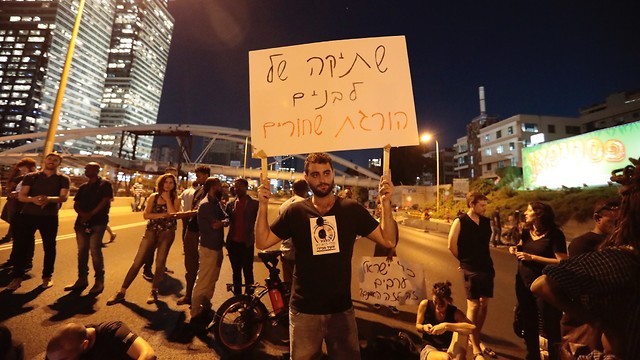

A n anti-racism protest in Tel Aviv, July 2019. The banner reads: White silence kills black people
(Photo: Moshik Shema)
But, in my eyes, the worst of it all is that these protests almost exclusively consisted of Ethiopian Israelis. As if it were our private issue that was not related to the general “white” population.
The media spoke of “the Ethiopian protest”, educated spokespeople spoke at length in their own eyes about “their problems” and “their young adults.”
As I look at pictures from the protests throughout the United States after a policeman in Minneapolis strangled African American George Floyd to death, I am both surprised and jealous. Alongside the many black people, there is a noticeable presence of white protesters.
I hope and wait for the Israeli public to learn that racism is not “the Ethiopians’ problem,” that police violence is not solely the problem of a dark-skinned minority.
We all – blacks and whites, secular and religious, leftists and rightists – must understand that the scourge of racism is not solely the problem of a specific sector in the population. At the end of the day, we are all “sectors.”
I encounter racist expressions towards “Ashkenazim,” towards “Moroccans,” towards “Arabs,” towards “ultra-Orthodox Jews,” towards “leftists.”
At the end of the day, we are all victims of hostility and prejudices. The more it has to do with an identified and distinct minority – in our case resulting from the color of our skin – the more intense the racism. The problem is that of society as a whole, while its eradication must be a task for the entire population.
The Israeli society must eradicate all forms of racism, uproot the prejudices, shatter the ignorance, defeat the condescension and sense of superiority, uproot the hostility.
7 View gallery
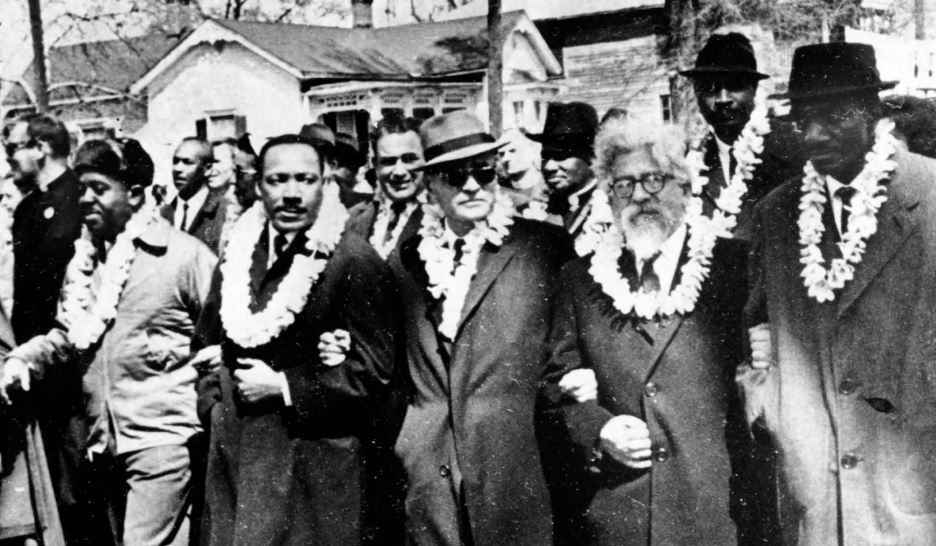

Rabbi Abraham Joshua Heschel, 2nd right, marching with Martin Luther King, 2nd left, in Selma, Alabama in 1965
(Photo: AP)
And just as Rabbi Abraham Joshua Heschel stood alongside Martin Luther King in the voting-rights marches in 1965, I too expect each and every man and woman in Israel with a sense of awareness of the importance of civil equality to stand alongside us in this joint struggle to change the face of Israeli society as a whole.
Genet Dasa is the CEO of Olim Beyahad, an NPO involved in promoting the employment integration of young Ethiopian Israeli adults and changing society’s perceptions and opinions of Ethiopian Israelis


